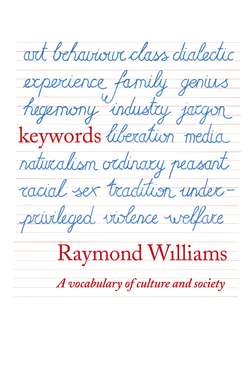Читать книгу Keywords: A Vocabulary of Culture and Society - Raymond Williams - Страница 34
CONSUMER
ОглавлениеIn modern English consumer and consumption are the predominant descriptive nouns of all kinds of use of goods and services. The predominance is significant in that it relates to a particular version of economic activity, derived from the character of a particular economic system, as the history of the word shows.
Consume has been in English since C14, from fw consumer, F, and the variant consommer, F (these variants have a complicated but eventually distinct history in French), rw consumere, L – to take up completely, devour, waste, spend. In almost all its early English uses, consume had an unfavourable sense; it meant to destroy, to use up, to waste, to exhaust. This sense is still present in ‘consumed by fire’ and in the popular description of pulmonary phthisis as consumption. Early uses of consumer, from C16, had the same general sense of destruction or waste.
It was from mC18 that consumer began to emerge in a neutral sense in descriptions of bourgeois political economy. In the new predominance of an organized market, the acts of making and of using goods and services were newly defined in the increasingly abstract pairings of producer and consumer, production and consumption. Yet the unfavourable connotations of consume persisted, at least until lC19, and it was really only in mC20 that the word passed from specialized use in political economy to general and popular use. The relative decline of customer, used from C15 to describe a buyer or purchaser, is significant here, in that customer had always implied some degree of regular and continuing relationship to a supplier, whereas consumer indicates the more abstract figure in a more abstract market.
The modern development has been primarily American but has spread very quickly. The dominance of the term has been so great that even groups of informed and discriminating purchasers and users have formed Consumers’ Associations. The development relates primarily to the planning and attempted control of markets which is inherent in large-scale industrial capitalist (and state-capitalist) production, where, especially after the depression of lC19, manufacture was related not only to the supply of known needs (which customer or user would adequately describe) but to the planning of given kinds and quantities of production which required large investment at an early and often predictive stage. The development of modern commercial advertising (persuasion, or penetration of a market) is related to the same stage of capitalism: the creation of needs and wants and of particular ways of satisfying them, as distinct from and in addition to the notification of available supply which had been the main earlier function of advertising (where that kind of persuasion could be seen as puff and puffery). Consumer as a predominant term was the creation of such manufacturers and their agents. It implies, ironically as in the earliest senses, the using-up of what is going to be produced, though once the term was established it was given some appearance of autonomy (as in the curious phrase consumer choice). It is appropriate in terms of the history of the word that criticism of a wasteful and ‘throw-away’ society was expressed, somewhat later, by the description consumer society. Yet the predominance of the capitalist model ensured its widespread and often overwhelming extension to such fields as politics, education and health. In any of these fields, but also in the ordinary field of goods and services, to say user rather than consumer is still to express a relevant distinction.
See WEALTH
